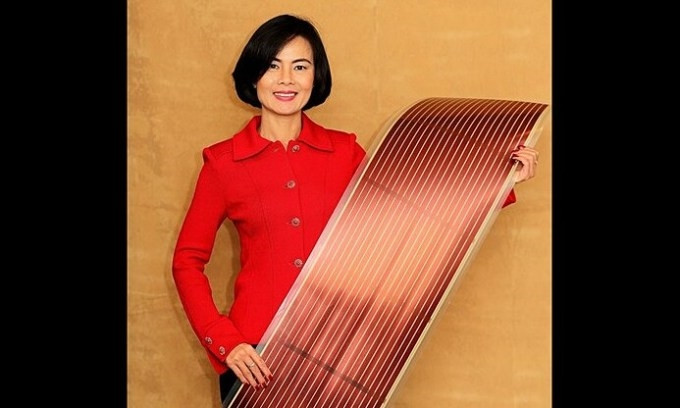Professor Nguyen Thuc Quyen has won many prestigious honors in her career.

Professor Nguyen Thuc Quyen holds an organic photovoltaics product made by herself. Photo by the Royal Society of Chemistry
Professor Nguyen Thuc Quyen from the Central Highlands province of Dak Lak has won the Royal Society of Chemistry’s 2023 de Gennes Prize for her advancements in climate-friendly technology.
Nguyen, 53, is currently director of the Center for Polymers and Organic Solids at the University of California Santa Barbara.
On its website, the Royal Society of Chemistry praised Quyen for her "seminal contributions to the development of organic semiconducting materials and device physics of organic photovoltaics to mitigate climate change."
According to the RSC, Nguyen's research interests center on organic semiconducting materials with a focus on processing protocols, characterization, and the development of structure-function-performance relationships to optimize their organic photovoltaic (OPV) performance.
OPVs are devices made from carbon-based materials that convert sunlight into electricity. They have attracted significant attention over the last two decades due to their low-cost solar power generation potential for buildings and greenhouses. Buildings account for about 40% of global energy consumption and there is an urgent need to design energy efficient buildings or zero-energy buildings (buildings that produce sufficient energy for their own operation).
OPVs are lightweight, flexible and semi-transparent and can be designed in various sizes, shapes, and colors. They can be wrapped around the exteriors of buildings or coat glass windows and greenhouses to generate energy. This makes them an ideal solution for reducing the carbon footprint of skyscrapers and high-rise buildings.
Professor Quyen said she hoped her story could serve as inspiration to others.
"This honor is not only for me but also for many women especially those in Vietnam where their education or career dream was shattered by life challenges," RSC quoted her as saying.
Born into a poor family in the Central Highlands town of Buon Me Thuot, Quyen moved to the U.S. with her family in 1991. At that time, she could barely speak any English.
But by 2015, she was one of four Vietnamese-born scientists named on a list of the world’s most influential scientists published by Thomson Reuters. She was on this list four times in a row.
She has won many prestigious honors in her career, including the Harold Plous Award in 2007, the Camille Dreyfus Teacher-Scholar Award Office in 2008, a Alfred P. Sloan Research Fellowship in 2009, and the Alexander von Humboldt Senior Research Award and the American Competitiveness and Innovation Fellowship in 2010.
She is also among the top 1% Highly Cited Researchers in Materials Science and Cross-Field, according to Thomson Reuters and Clarivate Analytics.
In February, she became the first woman scientist of Vietnamese origin to be elected to the U.S. National Academy of Engineering.
The de Gennes Prize was established in 2008 and is awarded biennially by the Royal Society of Chemistry for outstanding and exceptional work in the field of materials chemistry.
The prize honors the work of Pierre-Gilles de Gennes.
The winner receives £3,000 (US$3,795), a medal and a certificate, and takes part in a U.K. lecture tour.
VnExpress